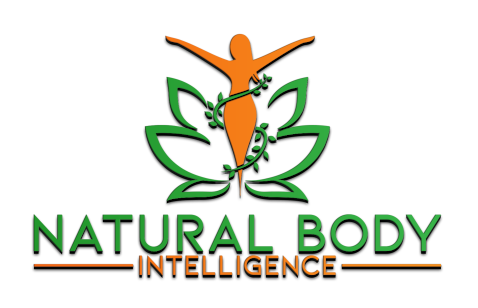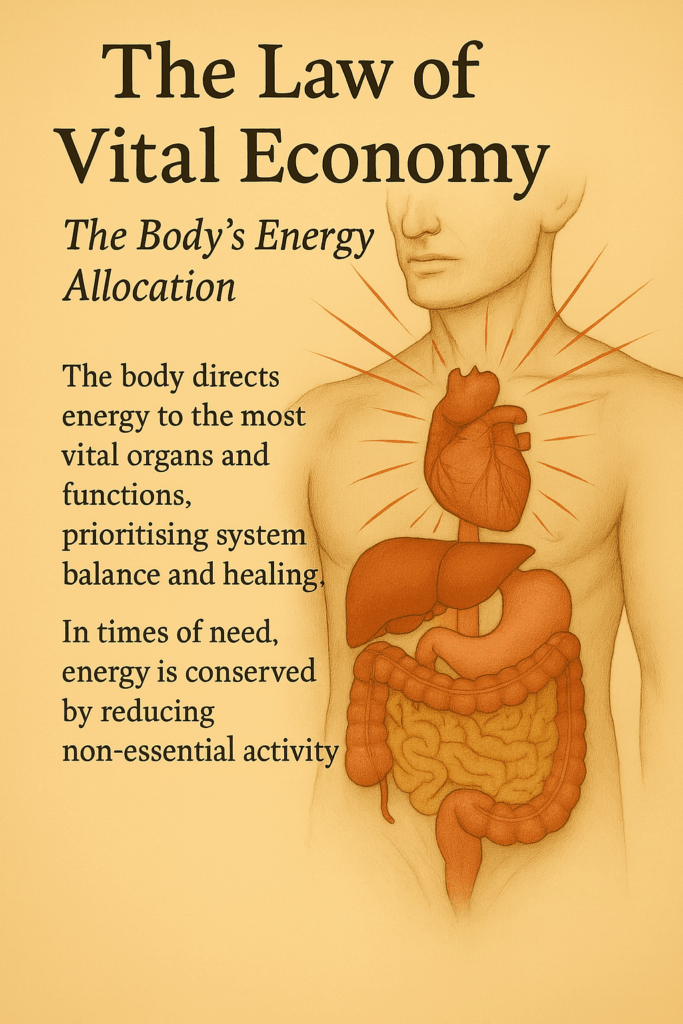The Law of Vital Economy is one of the most important principles in Natural Hygiene and biological health. It describes how the body uses its available energy in the most efficient and intelligent way possible. Every function in the body requires energy, from digestion and repair to thinking, movement and emotional processing. When energy is abundant, the body can maintain harmony, restore tissues and support all essential functions at once. When energy is limited, the body automatically redirects vitality to the areas that matter most for survival. Understanding this law helps us make sense of fatigue, symptoms, detoxification and the body’s choices under strain.
At the heart of the law of vital economy is the idea that the body must constantly decide how to allocate its energy. Just as a household must budget its finances, the body must budget its vitality. If energy is wasted on unnecessary tasks or excessive stimulation, there is less available for healing, repair and long term health. If the body is constantly required to digest heavy meals, process toxins or manage emotional stress, it uses up energy that would otherwise be directed to restoration.
This law helps explain why the body slows down in certain states. When we are ill, exhausted or emotionally overwhelmed, the body reduces appetite, decreases physical strength and encourages rest. This is not a sign of weakness but an intelligent strategy to conserve energy for healing. The body withdraws vitality from non-essential functions and redirects it towards immune activity, tissue renewal and detoxification.
Digestion is one of the most energy consuming processes the body performs. When someone eats heavy or complex meals throughout the day, the law of vital economy ensures that most of their available vitality is diverted to digestion rather than repair. This is why people often feel tired or mentally dull after eating. In contrast, when digestion is light, simple and aligned with nature, more vitality becomes available for cleansing and restoration. This principle forms part of the reason why fasting and fruit based diets often bring clarity, energy and improved wellbeing.
The law of vital economy also demonstrates why symptoms arise. When vitality is low and the body is overburdened, it cannot maintain all functions at once. Secondary functions are temporarily reduced so the body can focus on essential ones. For example, when the body is overloaded with toxins, it reduces energy for skin beauty, hair strength or complex mental processing. These areas begin to show signs of strain, not because they are faulty, but because the body has redirected resources elsewhere.
Fatigue is another expression of the law of vital economy. When the body is healing or cleansing, it naturally lowers energy output to prevent the person from wasting vitality on unnecessary action. Many people misunderstand this and try to push through fatigue with stimulants, heavy exercise or mental strain. This forces the body to divert energy away from healing, delaying recovery. Listening to fatigue is essential because it reflects the body’s current energy budget.
The law also explains healing crises. When someone improves their lifestyle, lightens their diet or reduces stimulation, more vitality becomes available for detoxification. The body uses this new energy to release stored waste, often causing temporary symptoms like fatigue, mucus, skin eruptions or emotional release. This is not disease but healing in progress. The body finally has the vitality to cleanse and rebalance.
Emotional wellbeing is another area where the law of vital economy applies. Emotional stress drains energy as much as physical stress. The more the mind is burdened with fear, resentment, overwhelm or unresolved conflict, the more vitality is taken from digestion, detoxification and repair. This is why chronic stress leads to digestive issues, lowered immunity and disrupted sleep. When emotional burdens lighten, the body can redirect energy to healing and resilience.
Sleep is one of the most powerful tools connected to this law. During sleep, the body allocates nearly all its available energy to repair and restoration. This is why late nights, irregular sleep and artificial light disturb healing. Every hour removed from sleep is an hour of lost restoration. People who live out of alignment with natural circadian rhythms often experience chronic low energy. Their vitality is spent coping with stimulation rather than supporting long term wellness.
Movement also affects how the law of vital economy plays out. Gentle, natural movement supports circulation, oxygenation and the removal of metabolic waste. Intense or excessive exercise, however, can drain vitality faster than the body can restore it. Many people push their bodies beyond their energy budget, leading to exhaustion, slow recovery and hormonal imbalance. Movement should complement the body’s resources rather than overwhelm them.
In modern life, many habits violate the law of vital economy. These include overeating, frequent snacking, stimulants, lack of rest, constant screen use, emotional overload and exposure to environmental toxins. All these factors drain vitality and reduce the body’s ability to heal. Reversing this trend requires a return to simpler, natural rhythms. Eating clean, water rich foods, sleeping early, reducing stress, breathing deeply and spending time in nature increase available vitality.
The law of vital economy empowers people to understand their bodies more deeply. Instead of seeing symptoms as random or frightening, we can see them as signals of energy redistribution. Instead of pushing through fatigue, we can recognise the body’s request for support. Instead of fearing detoxification, we can trust that the body is working to restore balance.
When we cooperate with this law, vitality rises. The body becomes more efficient, digestion becomes lighter, sleep becomes deeper and healing becomes more consistent. By respecting the law of vital economy, we honour the body’s natural intelligence and support long term wellbeing.

